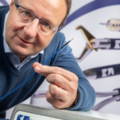
Written By:
Chris Hancock,
CTO and Founder
Creo Medical
___________________________________________________________________________________________________________________________
The past few days have made for difficult reading for Wales’ Life Sciences sector. From the Huge £27m written off by 'embarrassing' Welsh Government flagship investment fund – Wales Online, to the Abandoned cancer centre full of unused life-saving equipment despite record waiting lists in Wales – Wales Online and news of prominent sites elsewhere looking for new tenants. There is clear and concerning uncertainty about the future of flagship Welsh projects and the potential negative impact on the Medtech ecosystem in Wales, the effect on local employment and, not least, the services that NHS Wales is able to offer to its patients.
These challenges, however, also provide real opportunities for some of Wales’ unquestionable MedTech and HealthTech successes to grow and flourish here in Wales. Combining fantastic facilities lying empty or underoccupied with the innovative and groundbreaking solutions that are being developed to address NHS concerns in and around Wales provides a unique opportunity for our community to make an enormous difference to patients within our devolved Welsh NHS and beyond.
Welsh industry has a long history of collaboration, resulting in world leading ecosystems supporting significant economic contributors and employment opportunities for the Welsh economy. All the pieces are there to do so again in the life sciences sector, through harnessing existing, industry lead solutions specific to the demands of today’s NHS and the patients that NHS Wales serves whilst also developing a potential to be a blueprint for others in the UK to emulate.
Creo Medical, for one, would be very keen to form part of this solution, and indeed hold long-held ambitions of working with colleagues across sectors to deliver these solutions. Our devices, the most prominent of which is facilitating a move away from patients requiring bowel surgery towards minimally invasive day cases, are now in everyday use worldwide. The advanced energy that powers them and the clinical results being achieved outside of Wales are already proven to make a huge difference to multiple NHS trusts like East Kent and the Northern Care Alliance as well as being adopted by some of the world’s leading medical facilities such as Mayo Clinic, Cleveland Clinic, Sheba Medical Centre, AIG hospitals and others. Creo’s flagship device, Speedboat Inject, was recently CE marked for use in the upper GI Tract, including the oesophagus and stomach, allowing the treatment of more lesions and cancers than ever before.
Naturally, healthcare providers the world over want to be able to offer a clinical pathway which provides the opportunity of moving patients from surgical waiting lists to a day case setting – with all the clinical and resource benefits that come with that. However, In Wales, because of a lack of quality, affordable local facilities to train interested doctors or the ability to offer a holistic, pan health board, truly transformative service, it’s proven difficult to achieve this. In fact, Creo is currently forced to use a state-of-the-art facility in Spain as its primary training centre for a pipeline of UK and European doctors, all of whom are looking to introduce new services to patients. The reason why we have to go to Spain? Largely because it’s less resource intensive than any of the current options closer to home.
Bespoke medical facilities in South Wales are now lying empty. These facilities could help fill that gap, not just for Creo but for the many exciting MedTech companies across the region and elsewhere in the UK. This could act as a real shot in the arm for the Welsh NHS and the Welsh economy at an opportune time. You only have to look at the work being done by Cansense and others to know that Creo Medical would be far from alone in benefiting from improved infrastructure around testing, training, and adoption – and that’s just for one treatment pathway amongst hundreds.
This letter serves as an invite for all parties interested in making good these under used, existing facilities at our doorstep to come together as a matter of priority and share and align our needs and aspirations so we can make a real difference to patients and health boards whilst maximizing the infrastructure and skills that already exist along the M4 corridor. To this end, together with Business News Wales, we are looking to facilitate something in late September – with the IoD and others already engaged.
From adversity comes opportunity, and Wales could yet prove to benefit enormously from infrastructure that has yet to fulfill its undoubted potential.
Yours, with optimism,
Professor Chris Hancock
Founder and CTO, Creo Medical




